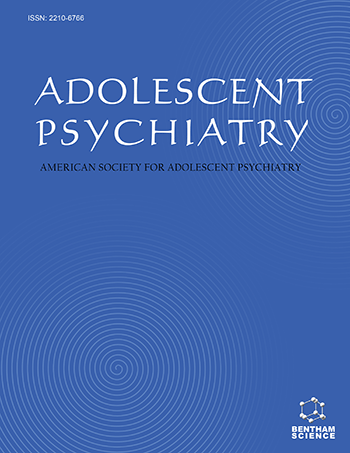Abstract
In the field of developmental research, there is a pressing need to develop clinically sounded and empirically grounded tools for the assessment of personality development in adolescence. After a review of the relevant literature on adolescent personality disorders we present through empirical data and clinical material the IPOP-A, a semi-structured interview for adolescents ranging from 13 years old to 21 years old. The IPOP-A seems to be promising to gather information about processes that constitute the building blocks of adolescent personality organization.
Keywords: Adolescent personality disorders, assessment, borderline personality organization, IPOP-A, personality development, semi-structured interview
Adolescent Psychiatry
Title: Assessment of Adolescent Personality Disorders Through the Interview of Personality Organization Processes in Adolescence (IPOP-A): Clinical and Theoretical Implications
Volume: 2 Issue: 1
Author(s): Massimo Ammaniti, Andrea Fontana, Audrey Clarkin, John F. Clarkin, Giampaolo Nicolais and Otto F. Kernberg
Affiliation:
Keywords: Adolescent personality disorders, assessment, borderline personality organization, IPOP-A, personality development, semi-structured interview
Abstract: In the field of developmental research, there is a pressing need to develop clinically sounded and empirically grounded tools for the assessment of personality development in adolescence. After a review of the relevant literature on adolescent personality disorders we present through empirical data and clinical material the IPOP-A, a semi-structured interview for adolescents ranging from 13 years old to 21 years old. The IPOP-A seems to be promising to gather information about processes that constitute the building blocks of adolescent personality organization.
Export Options
About this article
Cite this article as:
Ammaniti Massimo, Fontana Andrea, Clarkin Audrey, F. Clarkin John, Nicolais Giampaolo and F. Kernberg Otto, Assessment of Adolescent Personality Disorders Through the Interview of Personality Organization Processes in Adolescence (IPOP-A): Clinical and Theoretical Implications, Adolescent Psychiatry 2012; 2 (1) . https://dx.doi.org/10.2174/2210676611202010036
| DOI https://dx.doi.org/10.2174/2210676611202010036 |
Print ISSN 2210-6766 |
| Publisher Name Bentham Science Publisher |
Online ISSN 2210-6774 |
 25
25
- Author Guidelines
- Graphical Abstracts
- Fabricating and Stating False Information
- Research Misconduct
- Post Publication Discussions and Corrections
- Publishing Ethics and Rectitude
- Increase Visibility of Your Article
- Archiving Policies
- Peer Review Workflow
- Order Your Article Before Print
- Promote Your Article
- Manuscript Transfer Facility
- Editorial Policies
- Allegations from Whistleblowers
Related Articles
-
Freud Meets Bill W: A Model for the Dynamics of Alcoholics Anonymous
Adolescent Psychiatry Editorial (Thematic Special Issue: Coming of Age Online: Challenges of Treating the Internet Generation)
Adolescent Psychiatry Seizures Secondary to Bupropion Misuse/Abuse: Three Cases
Adolescent Psychiatry Keeping it Real: Overcoming Resistance in Adolescent Males Mandated into Treatment
Adolescent Psychiatry PIENSA: Development of an Early Intervention Program for Adolescents With Early-Onset Psychosis and Their Families
Adolescent Psychiatry Early Detection, Intervention, and Prevention of Psychosis Program: Rationale, Design, and Sample Description
Adolescent Psychiatry In-person vs. eHealth Mindfulness-based Intervention for Adolescents with Chronic Illnesses: A Pilot Randomized Trial
Adolescent Psychiatry Editorial: Forty Five Years and Counting
Adolescent Psychiatry Video Games and Sleep: An Overlooked Challenge
Adolescent Psychiatry Altering Outcomes in Juvenile Offending: The Evidence Base
Adolescent Psychiatry From 9/11 To 2011: A Brief Overview from a Child and Adolescent Psychiatry Perspective
Adolescent Psychiatry Self-esteem of Greek Adolescents: Changes in a Decade of Socioeconomic Hardship#
Adolescent Psychiatry New Pathways of Intervention for Adolescents at Clinical High Risk of Psychosis: Improving Meta-representation Skills and Strengthening Identity with Video-Confrontation Techniques
Adolescent Psychiatry Adolescence and Borderline Behavior - Between Personality Development and Personality Disorder
Adolescent Psychiatry History of Psychiatry in the Dominican Republic
Adolescent Psychiatry Stress-related Risk Factors for the Maintenance of Major Depression in Adolescent Girls
Adolescent Psychiatry How Do Parent-Child Interactions Predict and Maintain Depression in Childhood and Adolescence? A Critical Review of the Literature
Adolescent Psychiatry Non-Suicidal Self-Injury in an Adolescent: A Case Report and Discussion of Treatment
Adolescent Psychiatry Strategies for Autism Diagnosis and Care in Resource Deprived Settings in Africa: An Overview
Adolescent Psychiatry Editorial: Thinking About Thinking, the Self, and the Adolescent’s Search for Meaning
Adolescent Psychiatry

























